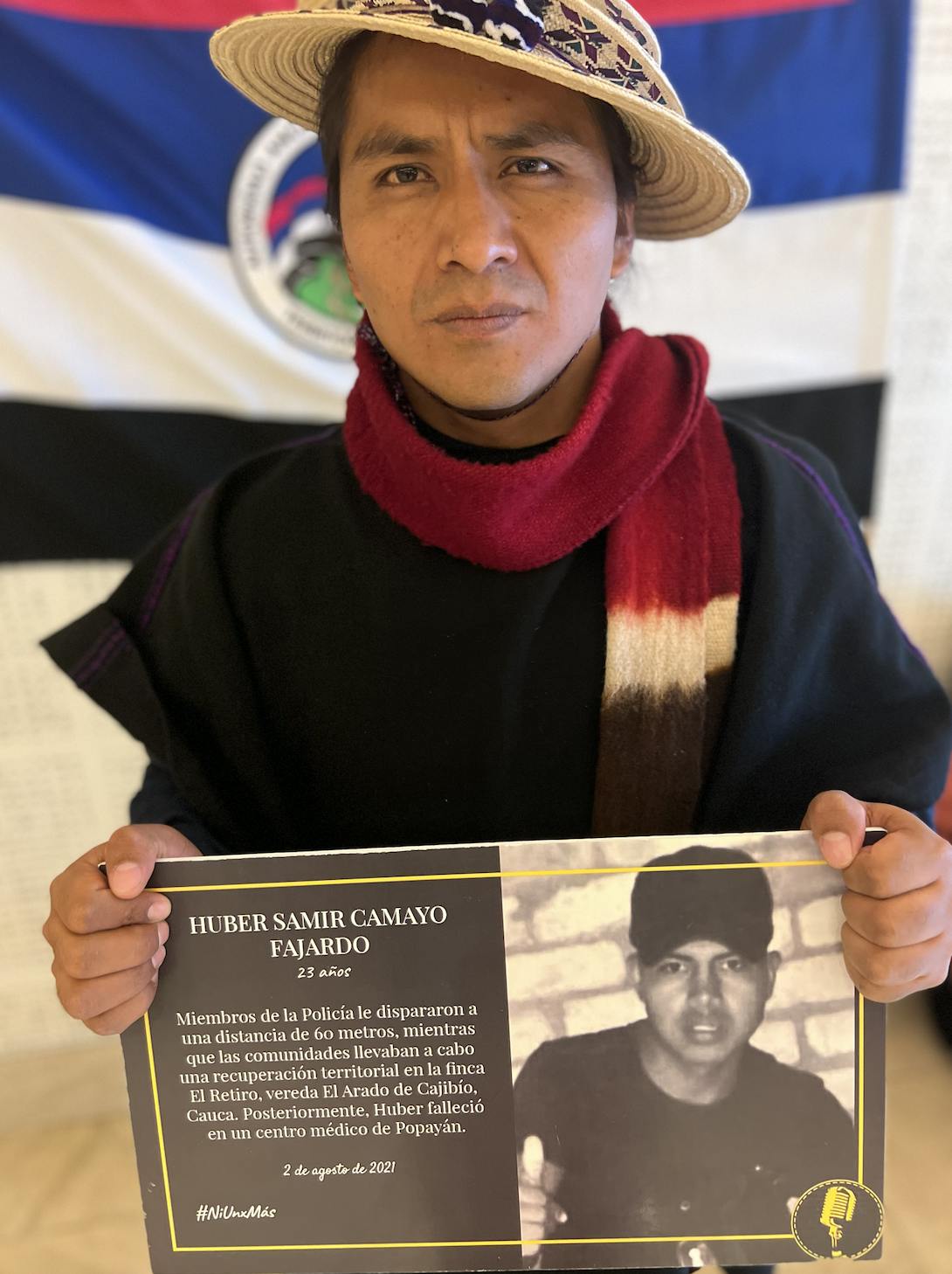December 13, 2022
Joint Statement by Front Line Defenders, SumOfUs and LASC
The Misak, Nasa and Kokonuko Indigenous peoples, together with campesino and Afro-descendant communities in the Cauca region of Colombia, have been facing violence in the process of seeking to recover their lands. The claimed lands are currently owned by the Irish company Smurfit Kappa, through its Colombian subsidiary Cartón de Colombia S.A.1 Since 2021, the communities have been taking action to recover their lands, including through demonstrations, filing claims and calls for dialogue with the company. However, their actions have been met with violent responses. Local communities have reported2 that this violence allegedly includes company officials, contractors and outsourced private security teams, which have exacerbated a context where the impacted communities lack human rights guarantees and human rights defenders are at heightened risk.
In 2021, the Indigenous, Afro-descendant and campesino communities of Cauca began peaceful demonstrations to reclaim their lands and to denounce the negative socio- environmental impacts caused by Smurfit Kappa's non-native pine and eucalyptus plantations. These peaceful demonstrations were repressed, including one on August 2, 2021, when the Mobile Anti-Riot Squad (ESMAD) violently evicted approximately 70 peaceful protesters from the company's property in the municipality of Cajibío, resulting in the death of one person, 23-year-old Huber Samir Camayo.3 Indigenous leaders and spokespersons of the land recovery movement have also been facing intimidation and threats. The situation of Misak indigenous leader and human rights defender Pedro Velasco4 is an emblematic case. Since 2021, Pedro has been the victim of different attacks, from receiving anonymous phone calls with death threats to being pursued on the road by unknown vehicles. The Misak leader has already denounced his situation to both the Colombian and international authorities,5 but so far these incidents have not been investigated and Pedro Velasco has not been granted State measures to protect his life.
It is worth mentioning that the case has had significant resonance internationally. The international human rights organizations Front Line Defenders, SumOfUs and Latin America Solidarity Centre (LASC) have been closely monitoring the situation of Pedro Velasco and the Indigenous communities involved in the context of the conflict with Smurfit Kappa and have made numerous calls for the Colombian authorities and Smurfit Kappa- Cartón de Colombia S. A. to address the situation with the seriousness and commitment it warrants. Several Irish parliamentarians and the United Nations mandates of the Special Rapporteur on the situation of human rights defenders; the Working Group on the issue of human rights and transnational corporations and other business enterprises; and the Special Rapporteur on the rights of indigenous peoples have also expressed their concern at the situation to both the Colombian government6 and the company.7
Despite numerous efforts to implement mediation measures that could provide human rights guarantees for the communities and efforts to generate conditions for dialogue between the company and the communities, the conflicts between the communities and the company continue to escalate, with the alleged presence of armed personnel linked to the company straining the situation further. On November 9, 2022 the indigenous guard and spiritual leader Juvencio Cerquera, of the Kokonuko Indigenous people, died after being hit by a projectile in the municipality of Sotará. According to reports from those present at the scene, the shot was fired by armed men attempting to evict the Paletará Indigenous reservation from La Unión farm. Eleven other people were wounded in the same eviction attempt.8 In the weeks prior to the killing of Juvencio Cerquera, the Paletará Indigenous Reserve had issued public statements9 denouncing several instances of threats and intimidation allegedly by workers and contractors of the company Smurfit Kappa-Cartón de Colombia S. A.
We express our concern at the above mentioned situation and at the use of firearms against the communities, putting at risk hundreds of people from the Indigenous, campesino and Afro-descendant communities impacted by the conflict. The use of private security personnel has a negative historical role in exacerbating the situation in the territories, leading to episodes of violence against traditional peoples and communities in conflict with extractive companies in Colombia. We call on Smurfit Kappa to ensure that its employees on the ground are not armed and do not seek to resolve the land dispute with indigenous groups through their own means. We emphasize the responsibility to solve conflicts regarding Indigenous people’s territories lies with the Colombian State.
We emphasize that the different Colombian government agencies have a fundamental role to play towards resolving the conflict between Indigenous, campesino and Afro-descendant communities and the company Smurfit Kappa – Cartón de Colombia S.A.. The State has the responsibility to guarantee human rights and social and community participation, in addition to generating spaces for effective dialogue that address communities’ territorial rights, seek the best resolution to the situation and guarantee the protection of the lives of human rights defenders involved in this process. Having committed to international treaties that safeguard the rights to self-determination and peaceful demonstrations,10 Colombia must guarantee these rights to all citizens.
Finally, we call on the Colombian authorities to investigate the acts of violence, killings and other human rights violations that have occurred in this context and to take appropriate measures against those responsible, and to put an end to this violence.
1https://www.thetimes.co.uk/article/native-groups-accuse-smurfit-kappa-ov...
2https://www.business-humanrights.org/pt/%C3%BAltimas-not%C3%ADcias/colom...
3https://www.business-humanrights.org/pt/%C3%BAltimas-not%C3%ADcias/colom...
4https://www.frontlinedefenders.org/en/profile/pedro-josse-velasco-tumina
5https://www.elespectador.com/colombia/mas-regiones/el-indigena-misak-que...
6https://spcommreports.ohchr.org/TMResultsBase/DownLoadPublicCommunicatio...
7https://spcommreports.ohchr.org/TMResultsBase/DownLoadPublicCommunicatio...
8https://www.colectivodeabogados.org/denuncia-por-ataque-a-la-comunidad-d...
9 See here, as the indigenous community does not have official online platform: Paletara and Sotara
10 https://www.ohchr.org/en/instruments-mechanisms/instruments/internationa...

Indigenous leader Pedro Josse Velasco Tumiña holding a poster denouncing the killing of Huber Samir Camayo

